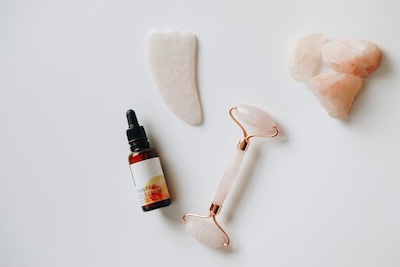These powerful little guys have been used for centuries in traditional medicine, and now they’re popping up in wellness routines everywhere, touting mental clarity, immune support, gut health, and stress relief.
Mushrooms are having a major moment right now—everywhere you look, brands are marketing their power-packed potential. There’s mushroom coffee, mushroom tea, mushroom cocoa, mushroom smoothies, mushroom powders, mushroom skin care… and yes, even mushroom jerky (not for me). So, why the sudden interest in all things mushrooms?
Because they’re nutritional powerhouses. Packed with adaptogens, antioxidants, and immune-building compounds. They’re magical little organisms that support the nervous system, gut health, energy, and focus. People are turning to them not just for the occasional brain boost, but as a daily staple—me included.
I was skeptical at first. But after taking mushrooms for over a year, they’ve changed my life for the better and now they’re a permanent part of my daily routine. I’ll never go without them again. As a busy mom of two boys, a yoga teacher, and the owner of two businesses (a marketing firm and a yoga app Zentric Yoga), I don’t have time for Complicated. Mushrooms appealed to me in the first place because they are touted as being effective, convenient, and—most importantly—backed by centuries of healing tradition.
I’m not talking about the mushrooms you throw on a pizza (though tasty), nor am I talking about psychedelic mushrooms (a conversation for another day). I’m talking about functional mushrooms.
These are powerful, medicinal fungi that support mental clarity, immune health, gut health, stress relief, and weight loss.
But here’s the catch—not all mushroom products are created equal. I’ve tried a lot of different mushroom products over the past year, and while some were easy to integrate into my routine, others…well, let’s just say I won’t be going back.
Drinking Mud
My first mushroom experience was with MUD/WTR, a mushroom coffee alternative. A fellow yoga teacher gifted me a can. It was marketed as a better-for-you coffee alternative: adaptogenic, jitter-free, focus-enhancing. I made it once, took a sip, and… nope. Let’s just say it lived up to its name. I tried another brand called Ryze, which promised to reduce belly fat and bloating. It tasted better, but it was still just a blend of mushroom powder and instant coffee—not something I could commit to daily. Next, I tried cacao-based mushroom blends from Four Sigmatic. They tasted better, but they felt too fussy—nothing I could easily integrate into my busy mornings.
Finally, I found my sweet spot: mushroom supplements and gummies. No prep required, easy to take on the go, and I still got all the benefits. Mushrooms are now and forever my daily ritual, and I’ll never go without them. I’m obsessed— and it’s changed my health for the better.
What’s Right for You?
Here’s a breakdown of the most popular mushrooms and what they’re known for:
• Lion’s Mane: Supports memory, focus, and cognitive performance.
• Reishi: An adaptogen for reducing stress and improving sleep.
• Cordyceps: Boosts stamina and energy—great for athletes.
• Turkey Tail: A powerhouse for gut health and immune support.
• Chaga: Antioxidant-rich and great for reducing inflammation.
• Shiitake: Excellent for heart health and immune support.
• Maitake: Known for supporting blood sugar regulation.
Personally, I rely on Lion’s Mane for focus, Reishi for rest, Cordyceps for energy, Chaga for gut health, and Turkey Tail for immunity.
What You Need to Know
Before you start buying mushrooms off Amazon, let’s talk about what matters: mycelium vs. fruiting bodies.
• Mycelium: This is the underground part of the mushroom, the root system, usually grown on grains. But here’s the thing—products made from mycelium could be diluted, with the grains it was grown on.
• Fruiting Bodies: These are the actual mushrooms—the caps and stems that grow above ground. This is where the active compounds like beta-glucans (immune support), terpenoids (anti-inflammatory), and ergothioneine (an antioxidant linked to healthy aging) are concentrated.
A Nod to Psilocybin: The Growing Popularity of Microdosing
Lately, psilocybin—aka the active compound in magic mushrooms—has been making waves in the wellness world. Microdosing, where you take just a tiny amount of psilocybin to boost mood, creativity, and focus, is becoming more and more popular. Psilocybin is even being studied in clinical settings to treat depression, PTSD, and anxiety, with some of the most exciting research happening right here at UAB. Personally, I’ve dabbled in microdosing. The insights and mental clarity that come from those experiences are mind-blowing. I’ll save that discussion for another time.
My Go-To Mushroom Brands
Here are my top picks based on quality, transparency, and effectiveness:
1. Auri Nutrition: My top choice. Their Super Mushroom Daily Gummies (with Lion’s Mane, Chaga, Maitake, Shiitake, Reishi, and more) are my daily go-to.
2. Stonehenge Health: Their Dynamic Mushrooms capsules (featuring Lion’s Mane, Chaga, Maitake, Shiitake, and Reishi) are excellent for an all-in-one option.
3. XPRS Nutra: They offer individual mushroom types in capsule form, so you can pick and choose which mushrooms to take based on your needs.
4. Sacred 7: Their mushroom extract powder mixes well into smoothies, coffee, or tea, and I love that it includes a broad variety of mushrooms like Lion’s Mane, Chaga, and Reishi.
The Bottom Line
Functional mushrooms are simple, low-effort and they work. They support your body’s systems, help you stay sharp, and make a noticeable difference in your energy, mental clarity, and immune health. Mushrooms are the real deal. No gimmicks, no fuss—just pure, powerful ingredients from Mother Nature. Have you tried functional mushrooms yet? Have question? Share your experience with me on Instagram @LaurenVogelYoga or email me at Lauren@ZentricLife.org.










